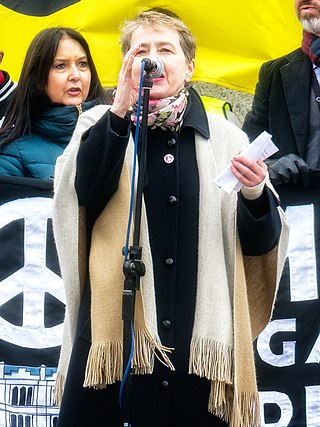
Central Europe is a geographical region of Europe between Eastern, Southern, Western and Northern Europe. Central Europe is known for its cultural diversity; however, countries in this region also share historical and cultural similarities.

Eastern Europe is a subregion of the European continent. As a largely ambiguous term, it has a wide range of geopolitical, geographical, ethnic, cultural, and socio-economic connotations. Its eastern boundary is marked by the Ural Mountains, whilst its western boundary is defined in various ways. Most definitions include the countries of Belarus, Russia, Ukraine, Moldova and Romania while less restrictive definitions may also include some or all of the Balkans, the Baltic states, the Caucasus and the Visegrád group.

In Nazi German terminology, Volksdeutsche were "people whose language and culture had German origins but who did not hold German citizenship". The term is the nominalised plural of volksdeutsch, with Volksdeutsche denoting a singular female, and Volksdeutscher, a singular male. The words Volk and völkisch conveyed the meanings of "folk".

Katharine Jane Hudson is a British left-wing political activist and academic who is the General Secretary of the Campaign for Nuclear Disarmament (CND) and former Media Officer of Left Unity. She served as Chair of CND from 2003 to 2010 and has been an officer of the Stop the War Coalition since 2002.
The Ukrainian Communist Party was an oppositional political party in Soviet Ukraine, from 1920 until 1925. Its followers were known as Ukapists, from the initials UKP.
The United Left was an alliance of several leftist opposition groupings in the German Democratic Republic. Among them were Christian socialists, Trotskyists, adherents of the Titoist system of workers' self-management and some Socialist Unity Party of Germany (SED) members, who were critical of their party's policy.
National communism is a term describing various forms in which Marxism–Leninism and socialism has been adopted and/or implemented by leaders in different countries using aspects of nationalism or national identity to form a policy independent from communist internationalism. National communism has been used to describe movements and governments that have sought to form a distinctly unique variant of communism based upon distinct national characteristics and circumstances, rather than following policies set by other socialist states, such as the Soviet Union.

Contemporary European History is an international peer-reviewed academic history journal founded in 1992 and published quarterly by Cambridge University Press. The journal covers the history of Europe from 1914 onwards and publishes three main types of article: research articles, review articles, and Spotlight essays. The journal also publishes a blog.
Holocaust trivialization refers to any comparison or analogy that diminishes the scale and severity of the atrocities that were carried out by Nazi Germany during the Holocaust. The Wiesel Commission defined trivialization as the abusive use of comparisons with the aim of minimizing the Holocaust and banalizing its atrocities. Originally, holocaust meant a type of sacrifice that is completely burnt to ashes; starting from the late 19th century, it started to denote extensive destruction of a group, usually people or animals. The 1915 Armenian genocide was described as a "holocaust" by contemporary observers.
The Leibniz Centre for Contemporary History Potsdam is an interdisciplinary research institute focusing on the contemporary history of Europe, especially Germany, and member of the Leibniz Association.

The Myth of the Eastern Front: The Nazi–Soviet War in American Popular Culture (2008) by Ronald Smelser and Edward J. Davies, is a historical analysis of the post-war myth of the "Clean Wehrmacht", the negative impact of the Wehrmacht and the Waffen-SS mythologies in popular culture, and the effects of historical negationism upon cultural perceptions of the Eastern Front of the Second World War.

Christian Hartmann is a German historian. He is a research fellow at the Institute of Contemporary History in Munich.
John Milfull was an Australian academic, educator and professor. In 1971 he was appointed as Professor of German and Head of the School of German at the University of New South Wales.

Irreligion in Hungary pertains to atheism, agnosticism, and secularism in Hungary. The tradition of irreligion in Hungary originates from the time of Austria-Hungary and it was a significant part of Communist rule in the second half of the 20th century. As of 2011, irreligion is the country's second largest religious stance after Catholicism.
Freedom of religion is recognized as a legal right in Hungary. The Fundamental Law of Hungary establishes the country as being founded on Christian values but guarantees the right to freedom of religion and freedom from religious discrimination. The history of religious freedom in Hungary has varied, with freedom of religion first recognized in 1919 before being restricted by Communist rule in the mid-20th century. Religious rights were restored following the end of Communism in Hungary, but the government under Viktor Orbán has been criticized for its restriction of religious freedoms.
This is a select bibliography of English language books and journal articles about the history of Poland. A brief selection of English translations of primary sources is included. Book entries have references to journal articles and reviews about them when helpful. Additional bibliographies can be found in many of the book-length works listed below; see Further reading for several book and chapter-length bibliographies. The External links section contains entries for publicly available select bibliographies from universities and national libraries. This bibliography specifically excludes non-history related works and self-published books.
This is a select bibliography of English language books and journal articles about the history of Belarus and Byelorussia. A brief selection of English translations of primary sources is included. Book entries have references to journal articles and reviews about them when helpful. Additional bibliographies can be found in many of the book-length works listed below. The External links section contains entries for publicly available select bibliographies from universities.
This page is based on this
Wikipedia article Text is available under the
CC BY-SA 4.0 license; additional terms may apply.
Images, videos and audio are available under their respective licenses.







